The best website creation software does not exist. However, there are solutions that are more suitable for your needs than others. In this article, we present the features of each of the 8 software options we have selected, highlighting their strengths and weaknesses, as well as their specific use cases.
- First, we explain the different types of website creation softwares.
- Second, we share our selection of the 8 best website creation platforms, revealing the features you can find in each of them. You can also refer to the comparison table of the different tools.
- Third, we provide useful tips for making your final choice, taking into account the specifics of your project.
Introduction: Why choose a website creation tool?
Before diving into the subject, it's important to remember that creating a website is not just about conception. Skills in programming, web design, SEO, and a deep understanding of current web technologies are also required, depending on the nature and complexity of your project.
Website creation softwares have removed many entry barriers, allowing everyone to design and publish a functional website quickly. These web creation tools are accessible and represent a considerable time-saver in the design process. Besides being user-friendly for most, they are customizable and easily modifiable.
However, it's important to note that website creation softwares do not meet everyone's needs. Websites created with such softwares are much less scalable and flexible than custom-made sites. For this reason, some businesses prefer to hire a professional web development agency to produce a site that fully aligns with their vision. Keep in mind that, even though the admin interfaces are easy to use, you must necessarily consider more technical aspects to ensure the vitality and performance of your site. This includes security, maintenance, web hosting, and regular updates, if they are not included in your subscription. These aspects require continuous attention and commitment after the creation of your website.

The different types of website creation softwares
Drag-and-drop website builders
These are online platforms that allow you to build a professional website without requiring specific computer skills. They are WYSIWYG (What You See Is What You Get) tools, meaning the interface is visual, enabling the user to immediately see the final result of their actions. Several pre-designed templates and layouts are available and customizable. The principle is as simple as the application: drag and drop elements, whether they are images, videos, or maps, onto your pages.
Content Management Systems (CMS)
A CMS is q website creation software that enables anyone, even without advanced technical skills, to design, manage, and maintain a website's content. Essentially, a CMS offers features designed to cater to the needs of editors and writers, covering layout, writing, and the production of various digital content, such as blog articles, videos, images, etc.
The admin interface is the biggest advantage of CMS. Often intuitive, it allows for visual formatting without having to manipulate HTML code. These content management systems are typically modular, which means you can add extensions or modules to enhance their core functionality. Moreover, they are highly customizable, offering great flexibility in the design of your website.
E-commerce platforms
An e-commerce platform is a software solution that enables merchants to manage a digital store. It includes website creation tools dedicated to e-commerce, accounting and inventory management systems, as well as sales tracking. Furthermore, it incorporates an infrastructure with features for customer service, order processing, and return management.

Open-source website creation softwares
For advanced web developers, open-source website creation softwares provide a blank canvas. Expression and creativity find their fullest manifestation here. These platforms offer complete freedom for customization ans the development of tailor-made features, and total control over the source code.
Among these open-source software options, we can mention Drupal, Adobe Commerce (formerly Magento), Ghost, Grav, and Joomla!
Looking to create a custom website? Contact our team and receive a free, no-obligation Anphos quote.
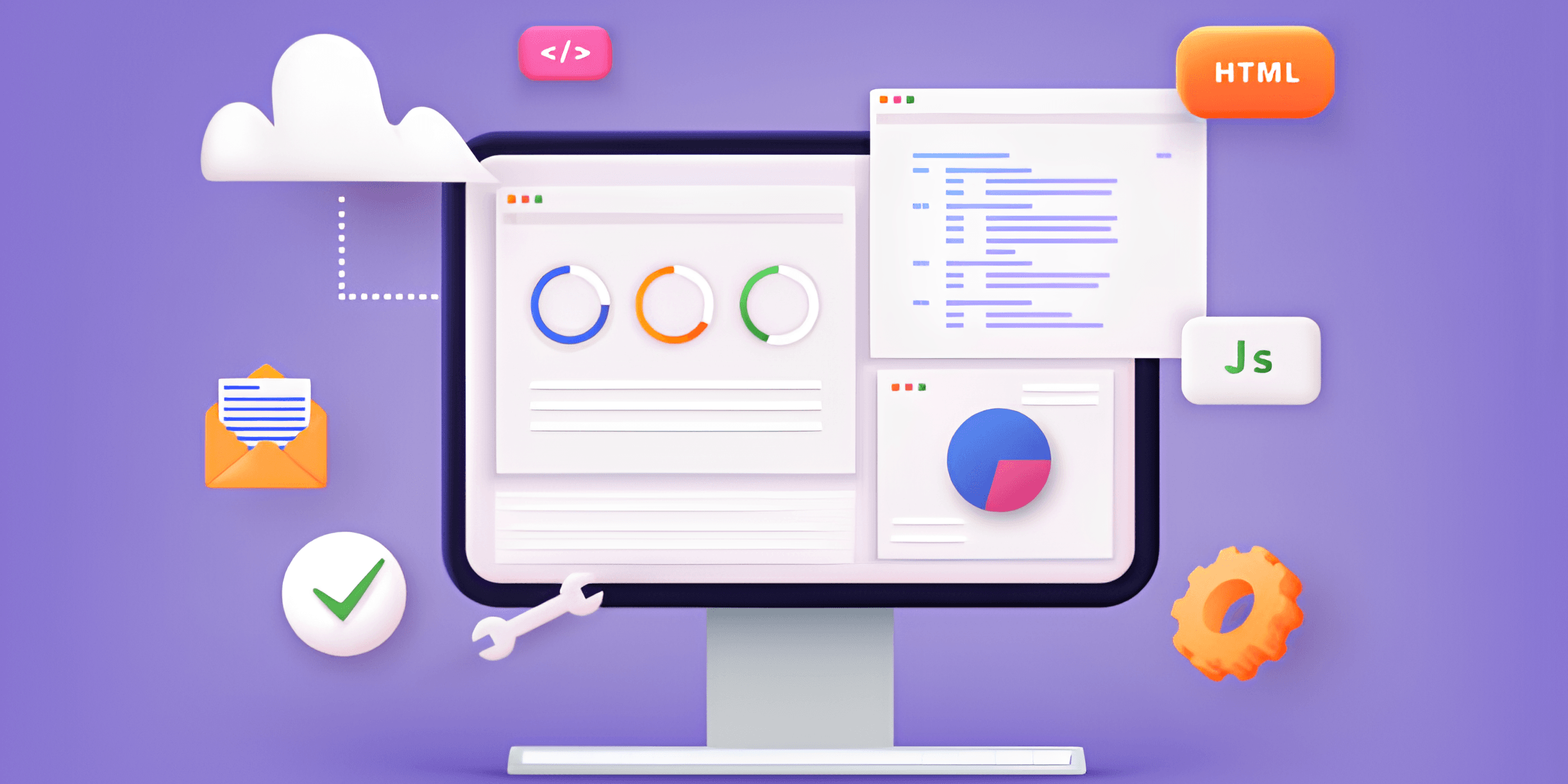
8 website creation softwares: Strengths, weaknesses, use Cases
Wix
Wix is an easy-to-use website builder, suitable for beginners and experienced users alike. However, it quickly becomes limiting for those who want more control over their site's design.
Pros
- User-friendly drag-and-drop interface;
- Hundreds of templates and apps to extend basic features;
- All-in-one solution with included hosting.
Cons
- Free version displays Wix ads and doesn't allow connecting a custom domain;
- Less responsive customer support;
- Difficult to change templates once the site is live;
- Your site isn't transferable, which means you'll have to stay on Wix forever.
Use cases: Wix is perfect for beginners looking to create a website quickly and easily. It's suitable for small businesses, artists, bloggers and event sites.
Compare the free version to the paid version of Wix.
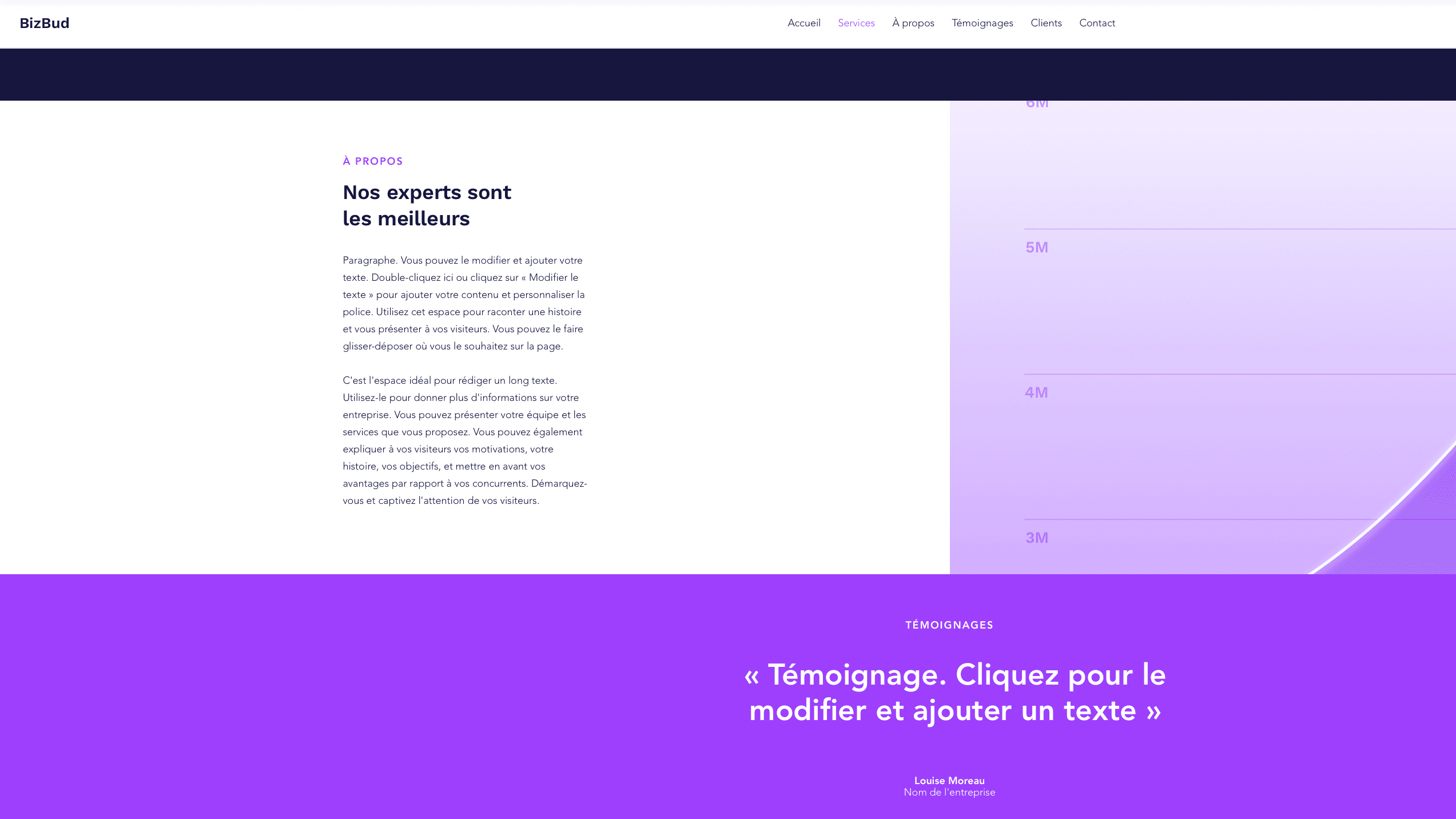
WordPress
Yes, talking about CMS without mentioning WordPress would be like discussing search engines without bringing up Google. It is the most widely used CMS in the world, and for good reason, as it offers customizable themes and plugins, in addition to being open source.
Here, we will exclusively discuss the SaaS version available at www.wordpress.com. Although there is a basic free version, its limitations are quickly reached, and additional costs add up right away.
Pros
- Extremely flexible and customizable with thousands of themes and plugins;
- Drag-and-drop interface with Elementor;
- Full control over code and design in the open source version;
- Good SEO features.
Cons
- Paid plugins and extensions;
- WordPress ads in the free version;
- Domain name becomes paid after one year;
- High security risks due to plugins.
Use cases: WordPress is suitable for users of all levels, from beginners to experienced developers. It is ideal for blogs, news sites, business websites, and even online stores with the WooCommerce extension.
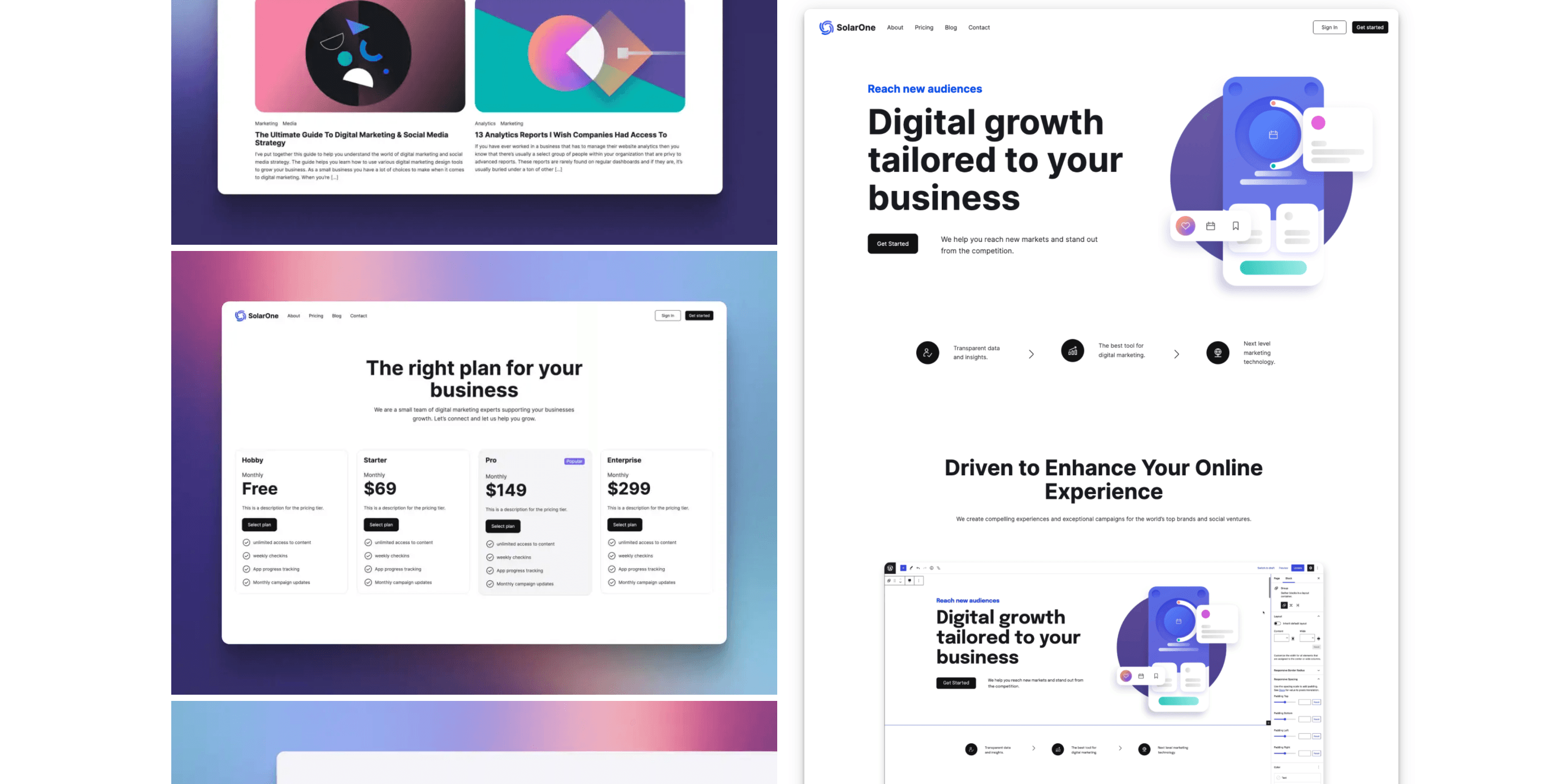
Webflow
Webflow is a CMS destined to "no code" designers seeking maximum design freedom. It's great for ambitious and visually appealing projects, but it can be more challenging for absolute beginners.
Pros
- Drag-and-drop interface for visual design;
- Generates clean code in the background for total control;
Cons
- Steep learning curve for beginners;
- Paid hosting.
Use cases: Webflow is primarily for designers and developers who want to create authentic websites while maintaining full control over code and design.
SiteW
SiteW is an online website builder aimed at web design novices. It offers customizable templates for various types of websites, including showcases, blogs and online stores. You can access a free trial version to test its features.
Pros
- Affordable prices;
- User-friendly drag-and-drop interface;
- Integrated hosting service.
Cons
- Less flexible compared to some other solutions regarding customization;
- Not suitable for complex websites and sophisticated online stores.
Use cases: SiteW is ideal for individuals, small businesses and entrepreneurs looking to create a simple and functional website quickly, without breaking the bank.
Squarespace
Squarespace is a design-focused CMS offering elegant and modern templates. However, it quickly reaches its limits when it comes to complex and demanding projects.
Pros
- Elegant and modern designs;
- User-friendly interface;
- Includes hosting, domain and support.
Cons
- Limited customization options compared to some other tools;
- Reduced SEO features;
- More suitable for visual, artistic, and creative websites.
Use cases: Squarespace is perfect for artists, photographers, creatives, and bloggers who want a visually appealing website.
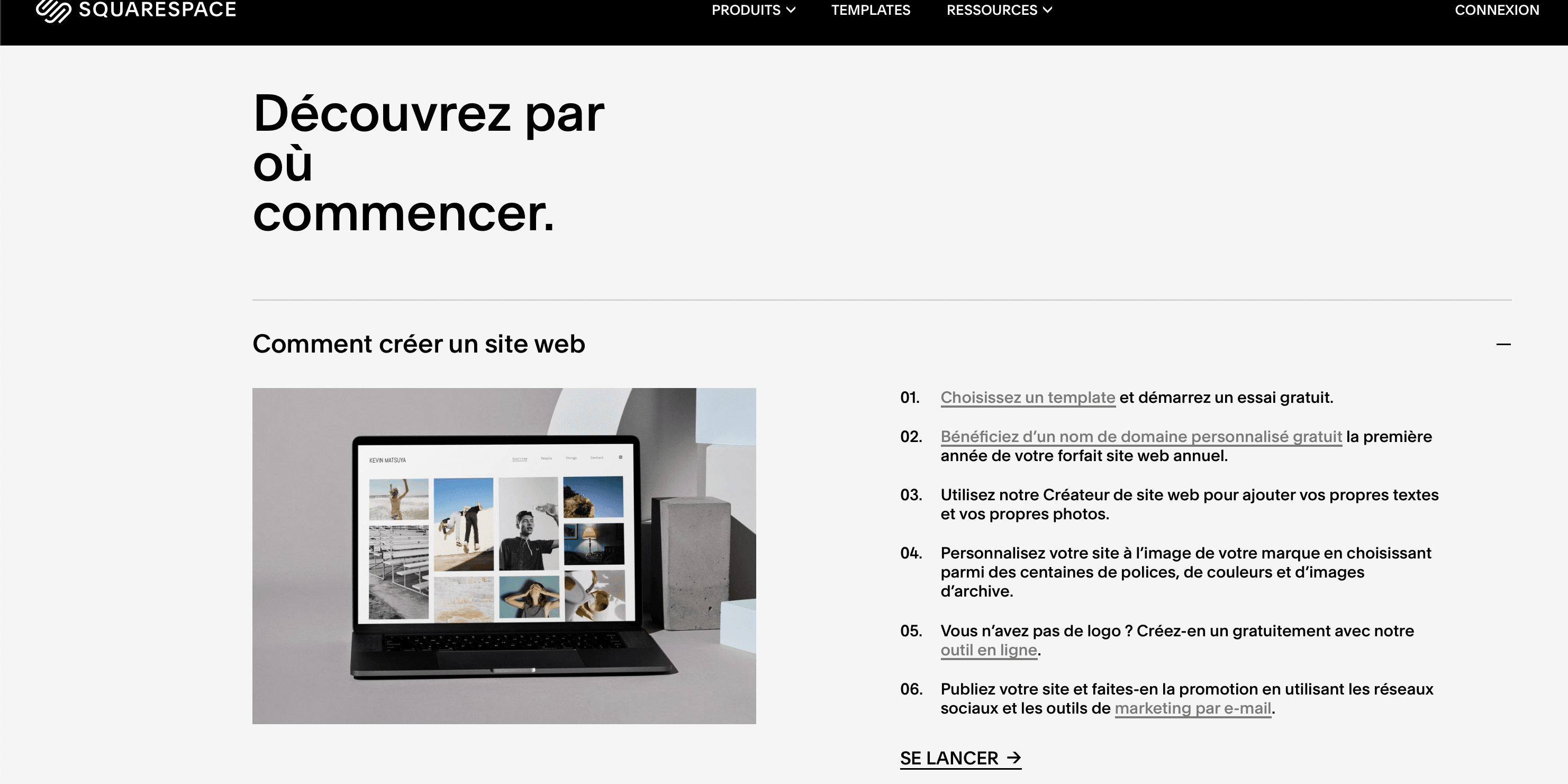
Unbounce
Unbounce is a landing page creation platform dedicated to digital marketing. It allows users to design highly optimized landing pages for conversion.
Pros
- Create landing pages for communication and digital marketing campaigns;
- Intuitive drag-and-drop interface;
- Facilitates A/B testing to optimize conversion rates and page performance;
- Seamless integration with many popular marketing and CRM tools.
Cons
- Expensive for small businesses;
- Unlimited landing pages, but visitor and conversion limits based on your selected plan.
Use cases: Unbounce is an ideal tool for marketers and sales teams looking to promote free trials to prospects.
Shopify
Shopify is a comprehensive e-commerce platform that makes it easy to create online stores. It offers a wide range of features for product, inventory, and sales management. Note that certain costs can add up quickly.
Pros
- Complete e-commerce platform;
- Easy creation and management of online stores;
- Integrated payment and order management options.
Cons
- Not suitable for other types of websites;
- Limited customization compared to other tools;
- Costs can accumulate based on the number of products online.
Use cases: Shopify is the go-to platform for e-commerce businesses looking to sell their products online professionally and efficiently.
PrestaShop
PrestaShop is an open-source e-commerce platform offering a complete solution for creating online stores, including various e-commerce features like product, inventory, sales, and online payment management. While the software itself is free, you will need to pay for hosting, extension modules, and themes to use it.
Here, we will exclusively discuss the SaaS version available at www.prestashop.fr.
Pros
- Open-source e-commerce platform;
- Customizable and feature-rich;
- Advanced product and order management options.
Cons
- More complex to use than some other e-commerce platforms.
Use cases: PrestaShop is suitable for users already with an e-commerce experience, who want a powerful and scalable platform.
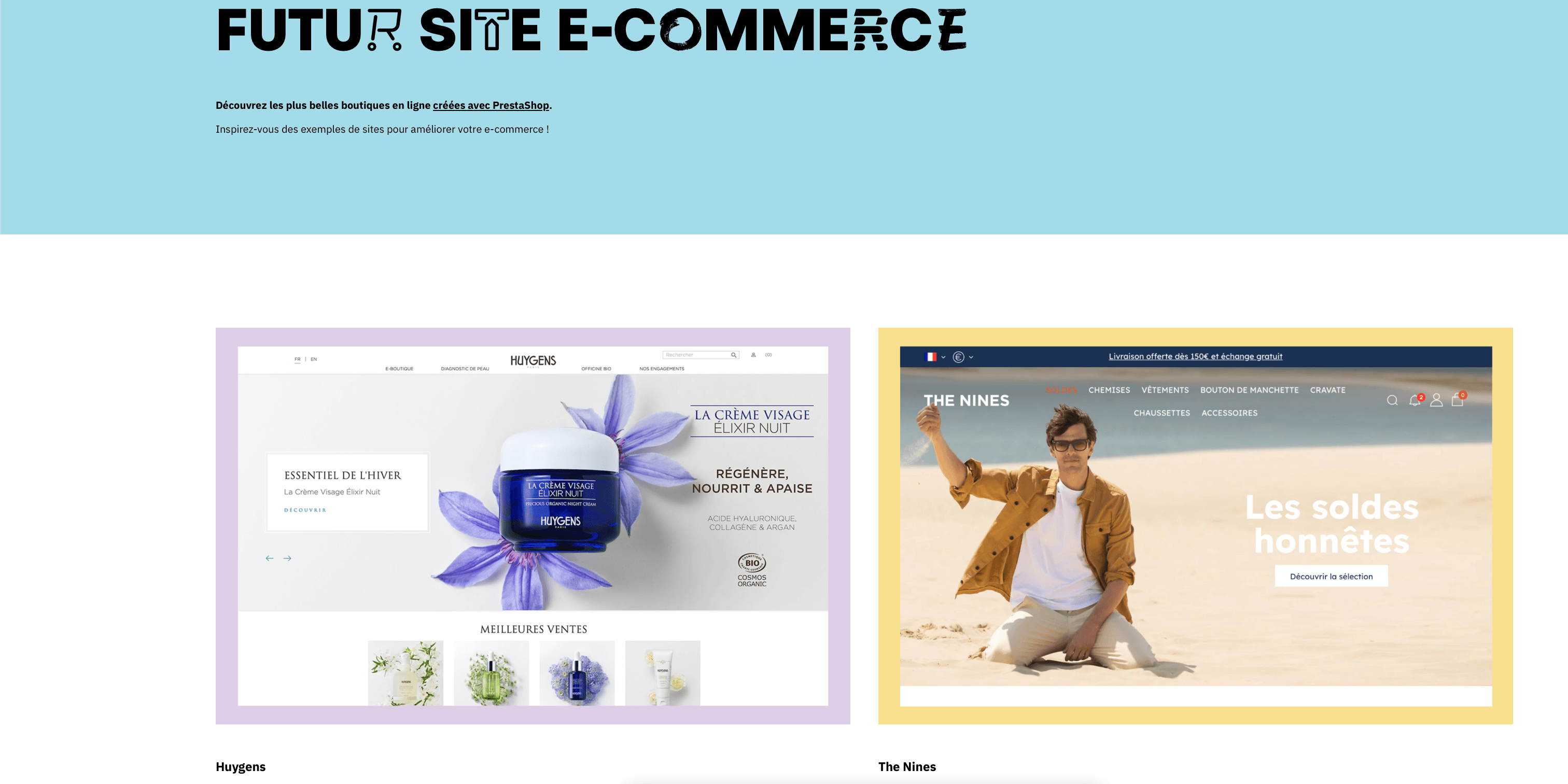
What features do website creation tools offer?
Drag-and-drop editor
The drag-and-drop feature has become standard in many website creation softwares. It allows users to place and customize elements on their site by simply dragging images, text, forms, buttons, and other visual elements to their desired location on the page. This makes design intuitive, even for beginners.
Pre-designed and customizable templates
Pre-designed templates are basic layouts that you can customize to match your brand. They are designed for various industries and types of websites, such as portfolios, blogs, business sites and even online stores.
Media libraries & image editing tools
Media libraries are used to store images, videos and audio files. This makes it easy to add visual and interactive elements to your pages. Moreover, some tools offer editing features to crop, resize and adjust images directly within the editor, without the need for third-party image editing softwares.
Mobile compatibility & responsive design
Mobile device compatibility is a necessity, especially for good SEO rankings. Designs created with these tools are automatically optimized to adapt to various screen sizes, ensuring a consistent user experience (UX) on smartphones and tablets.
However, the responsive designs offered by CMS are preset and may not meet your expectations. To ensure perfect mobile adaptability, opt for a custom design, made by professionnals.
Search Engine Optimization (SEO)
These are features aimed at improving your site's ranking on search engines, such as customizing meta tags (title, description, alt) and URLs.
Explore best SEO practices to boost your website's SEO.
Comparison of no-code website creation softwares: Pricing and limits
| Version gratuite | Tarifs mensuels | Limites | |
|---|---|---|---|
| WordPress | Yes | 0 € - 45 € | Additional transaction fees along with standard processing fees; Paid themes and extensions; Paid domain name after 1 year |
| Wix | Yes | 0 € - 102 € | Paid domain name after 1 year; Wix ads in the free version; Non-interchangeable themes; Your site is not transferable |
| Webflow | Yes | 0 € - 35 € | Free version limited to 2 pages; Steep learning curve for beginners |
| SiteW | Yes | 0 € - 17,50 € | Free version limited to 5 pages; Limited free storage; SiteW branding in the free version and the €6.60 version |
| Squarespace | No | 11 € - 36 € | Limited to 2 contributors in the cheapest version |
| Unbounce | No | 89 € - 379 € | Suitable for landing pages only |
| Shopify | No | 36 € - 384 € | Payment processing fees (1.8% + €0.25 online); Limited customization |
| PrestaShop | Yes | 0 € | Free at its core, but paid add-on modules; Costs increase based on the number of e-commerce products to sell |
How to choose the best website creation tool for you?
Identifying your needs
The first step is to understand why you need a website.
- What is the purpose of your site?
- What type of content will you publish?
- Who is your target audience?
These answers will help you define the essential features and characteristics of your site.
Assessing your skill level
If you're new to web design, prioritize user-friendly "drag-and-drop" site builders. If you are an experienced developer or designer, you can opt for more advanced tools, even open source solutions.
Setting your budget
Some softwares are free, while others come with monthly or annual fees. Make sure you understand the associated costs, including those related to hosting and domains in the case of open source solutions.
Explore all direct and indirect costs related to creating a website.
Analyzing the offered templates and features
Check if the software offers design templates that match your industry or site's purpose. Then, ensure these templates are customizable, allowing you to adjust layout, colors, fonts and images to reflect your brand's identity.
Next, explore available features, such as contact forms, image galleries, blogs, e-commerce tools, third-party integrations, etc. Choose a software that offers what you need for your website.
Testing the software yourself
- Free trials: Some softwares offer free trials, allowing you to create a temporary site without financial commitment. Take advantage of these trials to explore features, the interface, and ease of use. Choose a trial period long enough to evaluate the service properly.
- Free versions: Some platforms have free versions with basic features. Create a small project to test the software and become familiar with how it works.
- Tutorials and resources: Use tutorials, documentation and online resources provided by the software to learn how to use it effectively. This might include explanatory videos or step-by-step guides to help you get started.
- Customer support: If you have questions during your trial, don't hesitate to contact the software's customer service. This will help you assess their responsiveness and problem-solving capabilities.
Which is the best website creation software for you?
For all professionals (beginners or experts)
- WordPress
- SiteW
For artisans, merchants and freelancers
- WordPress
- Wix
For e-commerce
- Shopify
- PrestaShop
- WooCommerce (WordPress extension)
For marketers, designers and small businesses
- Webflow
- Unbounce
For bloggers and freelancers
- WordPress
- Wix
- Squarespace
Steps to create a website
Learn how to create a website step by step.
Conclusion: To ensure your success, call on our expertise!
Whether you're a novice or an expert, there's a tool that suits you. By clearly defining your goals, evaluating your skills and selecting the right software, you can create a professional website. Regardless of the chosen platform, the key is to create a website that represents you while focusing on a smooth and enjoyable user experience (UX/UI).
However, not all projects can be managed internally, especially those requiring advanced features, enhanced security, or custom design. In such cases, it's best to rely on a professional web development agency.
Anphos has in-depth expertise in tailored web solutions. Comprising developers, designers, and SEO and digital marketing specialists, our team is at your service to discuss your project in detail. Whether you need a showcase website, an e-commerce site, or even a custom application, our expertise is dedicated to your ambitions.
In addition to staying at the forefront of technology, creating 100% tailor-made designs to your desires and optimizing your online presence, we take care of hosting and the ongoing maintenance of your website. In case of any issues, you benefit from professional and responsive support.
Because we are committed to contributing to your digital success, we offer competitive prices without compromising on quality. Request your personalized Anphos quote, free of charge, and with no obligation.
